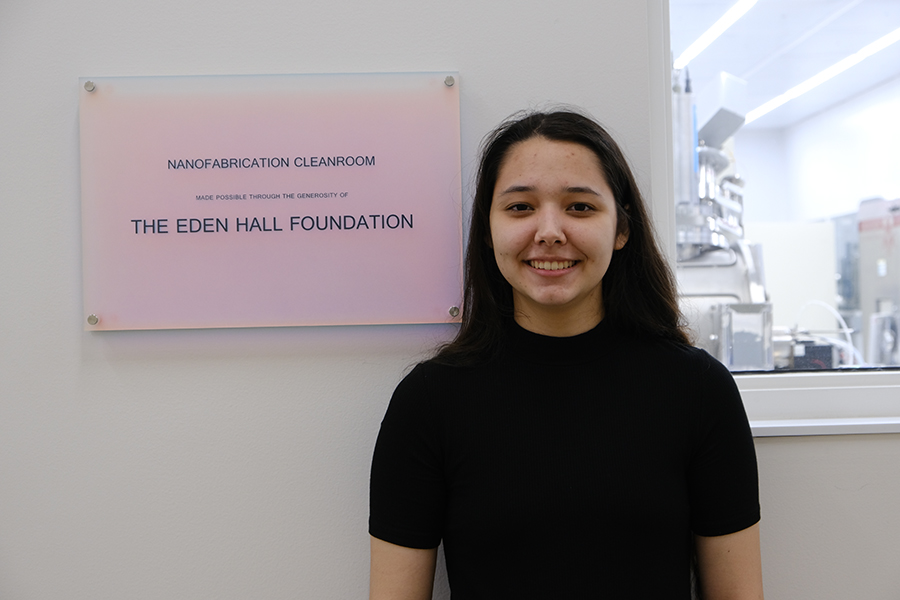
Parry Receives Goldwater Scholarship
By Krista Burns
Media InquiriesKatherine Parry, a junior in electrical and computer engineering, has received the 2024 Barry Goldwater Scholarship to support her pursuit of a research career.
The prestigious award, given by The Barry Goldwater Scholarship and Excellence in Education Foundation, provides scholarships to college sophomores and juniors who intend to pursue research careers in the natural sciences, mathematics, and engineering. The Goldwater Foundation is helping ensure that the U.S. is producing the number of highly-qualified professionals the Nation needs in these critical fields.
“Katherine is amazing and beyond deserving of the Goldwater Scholarship,” says Larry Pileggi, the Coraluppi Head and Tanoto Professor of Electrical and Computer Engineering. “When I first met her as a freshman, I was astonished by her passion and dedication to research. Her work is the caliber of that for a Ph.D. student, so I am excited to see the outcomes.”
From an estimated pool of over 5,000 college sophomores and juniors, 1,353 science, engineering, and mathematics students were nominated by 446 academic institutions to compete for the 2024 Goldwater scholarships. Of the students who reported, 188 of the Scholars are men, 236 are women, and virtually all intend to obtain a Ph.D. as their highest degree objective.
“It is exciting to be recognized for my many years of intensive research,” says Parry. “I am glad to contribute to the prominence and recognition that Carnegie Mellon University and the College of Engineering deserve.”
Parry’s research focuses on designing faster computers through alternative approaches to computation.
“DNA sequencing, which results in new cures, and Machine Learning have only become feasible with faster computation,” explains Parry. “Interesting changes are being experienced as transistors are measured in twenty-atom widths, and wire accounts for more delay than transistor gates. We're coming to the end of smaller circuitry. What will we do then? That is the answer I'm chasing.”
Parry is not a stranger to research. At the age of sixteen, she was working on a Mandelbrot generator for a science fair project. While focusing on increasing the processing speed, she discovered instances that had yet to be addressed.
“Mandelbrots are very square intensive, and I wanted to speed it up,” Parry explains. “I did some googling and came across a couple of papers by T.C. Chen and R.H. Strandberg on how they cut the square computation in half by using Boolean logic to combine terms. However, I noticed some commonalities in the remaining elements that they hadn't addressed. I started playing around with the logic, and the elements got ugly and complicated. Tenacity is an important characteristic of a researcher. I persisted, and suddenly, I was looking at something incredibly beautiful. Those ugly computations suddenly simplified. The optimization of squares is measured in the number of additions required. The previous 16-bit squarer requires 35 adds; mine takes 29.”
As a homeschooled student in South Dakota, there were limited opportunities for Parry to discuss her findings with others. Turning to the internet, she came across a call for papers for the IEEE Symposium on Computational Arithmetic (ARITH).
“I quickly did my best to write a research paper that was due soon. They would know if I had done something original. Their response was an invitation to speak to the world's leading computer researchers at their symposium in Kyoto, Japan. Because of that talk, I became part of their community, and even though they are all across the world, we correspond often. The talk also resulted in my first published paper.”
When it came time to apply to colleges, Carnegie Mellon University was the clear choice in her mind.
“Not only does Carnegie Mellon have the most professors teaching computer design, but we have all the tools, and unheard of, we can tape-out computer chips,” explains Parry. “I have had several very famous researchers from the ARITH community envious of my CMU resources and ask to co-author papers so I can provide more credibility to their ideas. It wasn't by chance; I made a very informed decision in choosing CMU.”
As for her career goal, that is an easy decision, too.
“I want nothing more than to be a research professor at CMU,” says Parry. “I love doing research, and Carnegie Mellon University is a great place to do it.”